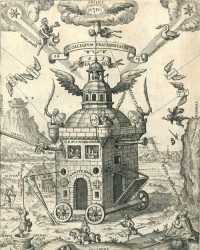Spirit
From The Art and Popular Culture Encyclopedia

Illustration to the Speculum Sophicum Rhodostauroticum (1618) by Teophilus Schweighardt Constantiens

Illustration: Henri Robin and a Specter, 1863 by Eugène Thiébault
|
"Thus we must not be astonished if the world is filled with vain and ridiculous opinions, and nothing is more capable of making them current than ignorance, which is the sole source of the false ideas that exist regarding the Divinity, the soul, and the spirit, and all the errors depending thereon." --Treatise of the Three Impostors I know it is in you --"The Spirit's in It" (1981) "After having forged these Gods they were curious to know of what matter they consisted, and finally imagined that they should be of the same substance as the soul. Then being persuaded that the latter resembled the shadows which appear in a mirror, or during sleep, they believed that some Gods were real substances but so thin and subtle that to distinguish them from bodies they called them Spirits. So that bodies and spirits were in effect the same thing, and differed neither more nor less, and to be both corporeal and incorporeal is a most incomprehensible thing. The reason given is that each spirit has a proper form, and is included within some limit, that is to say that it has some boundaries, and consequently must be a body however thin and subtle it might be." --Treatise of the Three Impostors "I cannot conclude these details of some very singular passages in a life at all times sufficiently eventful, without again recalling to the attention of the reader the merits of that indiscriminate philosophy which is a sure and ready shield against those shafts of calamity which can neither be seen, felt nor fully understood. It was in the spirit of this wisdom that, among the ancient Hebrews, it was believed the gates of Heaven would be inevitably opened to that sinner, or saint, who, with good lungs and implicit confidence, should vociferate the word "Amen!" It was in the spirit of this wisdom that, when a great plague raged at Athens, and every means had been in vain attempted for its removal, Epimenides, as Laertius relates, in his second book, of that philosopher, advised the erection of a shrine and temple "to the proper God.""--"Loss of Breath" (1832) by Edgar Allan Poe |
|
Related e |
|
Featured: |
Spirit(s) commonly refers to:
- Liquor, a distilled alcoholic drink
- Spirit (animating force), the non-corporeal essence of living things
- Spirit (supernatural entity), an incorporeal or immaterial being
Spirit(s) may also refer to:
Contents |
Philosophy, religion and folklore
- Spirituality, pertaining to the soul or spirit
- Holy Spirit, a divine force, manifestation of God in the Holy Trinity, or agent of divine action, according to Abrahamic Religions
- Great Spirit, conception of a supreme being prevalent among some Native American and First Nations cultures
- Vitalism, a belief in some fundamental, non-physical essence which differentiates organisms from inanimate, material objects
- Pneuma, an ancient Greek word sometimes translated as 'spirit'
- Soul, the spiritual part of a living being, often regarded as immortal
- Mind-body dualism, the view that mind and body are distinct and separable
- Geist, a German word corresponding to ghost, spirit, mind or intellect
- Psyche (psychology), a Greek word for 'soul' or 'spirit' and used in psychology
- Genius (mythology), a Latin word for a divine spirit present in every individual person, place, or thing
Mood
- Spirit, a mood, usually in reference to a good mood or optimism ("high spirits")
- Spirit, a feeling of social cohesiveness and mutual support, such as team spirit, such as that encouraged by team building activities
Etymology
From Middle English spirit, from Old French espirit (“spirit”), from Latin spīritus (“breath; spirit”), from Proto-Indo-European *(s)peys- (“to blow, breathe”). Compare inspire, respire, transpire, all ultimately from Latin spīrō (“I breathe, blow, respire”). In this sense, displaced native Middle English gast (from Old English gāst), whence modern English ghost. Doublet of esprit, spiritus and sprite.
See also
- Brethren of the Free Spirit
- Free spirit
- Geist
- Spiritual
- Spirited Away
- Spirit (band)
- Spirit of place
- Spirit photography
- Spirit possession
- The spirit is willing, but the flesh is weak
- The New Spirit (1890) by Havelock Ellis

